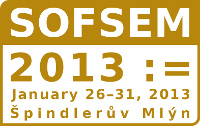SOFSEM 2013 := Tracks & Topics
SOFSEM 2013 will consists of four tracks covering major subareas of current computer science: the traditional track on Foundations of Computer Science and three tracks devoted to leading developments in contemporary areas. Original contributions are solicited, presenting new research results in the theory and practice of computer science in each subarea designated for SOFSEM 2013 (see below). Each track has its own program chair and program committee, for peer reviewing and feedback to authors. Please consider the appropriate track of SOFSEM 2013 and join in the pleasant and stimulating atmosphere of SOFSEM.
SOFSEM 2013 tracks:
- Foundations of Computer Science
Track Chair: Giuseppe F. Italiano (University of Rome "Tor Vergata", Italy )
) - Software & Web Engineering
Track Chair: Jerzy Nawrocki (Poznan University of Technology, Poland )
) - Data, Information
and Knowledge Engineering
Track Chair: Harald Sack (University of Potsdam, Germany )
) - Social Computing and Human Factors
Track Chair: Frans C. A. Groen (Intelligent Systems Lab Amsterdam, The Netherlands )
)
For students, there is the:
- Student Research Forum
Track Chair: Roman Špánek (Institute of Computer Science, Academy of Sciences, Czech Republic )
)
Foundations of Computer Science
The track is devoted to the recognized core areas forming the heart of computer science, and covering many different fields. Contributions are typically distinguished by an emphasis on mathematical background techniques, but quite often with significant impact on practical applications and systems. In other words, contributions that illustrate the value of fundamental research for applications are especially welcome. Such contributions have traditionally received a lot of attention at SOFSEM conferences, since its birth in 1974.
Topics include (but are not limited to):
|
Track Program Committee:
|
Software & Web Engineering
The track is devoted to the research of novel and innovative principles and technologies to software and web engineering, including both application and data engineering along with service-based approaches. As the World Wide Web is an important major platform for delivering software applications and services and a source of data, specific methods and engineering techniques are necessary to successfully create, maintain, and test such applications and/or the content they work with.
Topics include (but are not limited to):Software and Web Applications Engineering
Software and Web Data Engineering
|
Track Program Committee:
|
Data, Information and Knowledge Engineering
The track is devoted to all aspects of eliciting, acquiring, modeling, storing, and managing data, information, and knowledge, as well as the theory, design, and construction of knowledge-intensive systems and for web information systems including services for the semantic web, knowledge management, e-business, natural language processing, intelligent information integration, etc.
Topics include (but are not limited to):
|
Track Program Committee:
|
Social Computing and Human Factors
Topics include (but are not limited to):
|
Track Program Committee:
|
Student Research Forum
An integral part of the SOFSEM 2013 will be the Student Research Forum (SRF) organized with the aim to publish and discuss student projects in the field of theory and practice of Computer Science. The forum will offer students the opportunity to receive feedback on both the originality of their scientific work results and the work in progress. The papers will be reviewed and selected by the corresponding SOFSEM 2013 Program Committee as contributed papers. This gives the students the means to obtain a valuable feedback on their work and also a possibility, in case their paper is accepted for the corresponding tracks, to have their paper published in the main Springer LNCS proceedings.
Student papers of sufficient high quality but not accepted for the regular track, will be accepted to the SOFSEM 2013 Student Research Forum which will give the students the opportunity to present their paper to the main SOFSEM audience and also to get the paper published in SOFSEM local proceedings.
To be eligible, all authors of the paper must be students (except possibly their advisors). Sufficient space for discussion and exchange of experience will be provided during the forum itself and will continue throughout the conference. Best Student Paper and Best Student Presentation will be awarded during the conference.
 )
) )
) )
) )
) )
) )
) )
) )
) )
) )
) )
) )
) )
) )
) )
) )
) )
) )
)


